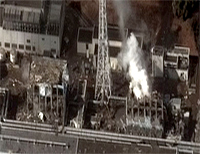 RUMOURS have been rife since late 2010 that Prime Minister Datuk Seri Najib Razak might call for the 13th general election by this year before the economy takes a worse turn. As such, not just political parties but civil society has been gearing up for an impending election.
RUMOURS have been rife since late 2010 that Prime Minister Datuk Seri Najib Razak might call for the 13th general election by this year before the economy takes a worse turn. As such, not just political parties but civil society has been gearing up for an impending election.
Among the civil society groups are a group of environmentalists, who set up Green Voters in July 2011 to mainstream and highlight environmental issues at the upcoming elections. The collective has yet to finalise its action plan but the idea is to focus candidates and political parties’ attention on environmental issues.
It would be amazing if all contesting candidates in the next general election were posed key questions on the environment in their respective constituencies à la The Nut Graph’s MP Watch project.
It is difficult to narrow down the key environmental questions, considering the many environmental issues Malaysia needs to tackle, but here are the questions I would ask candidates standing in my constituency:
1. What’s your stand on nuclear power? Do you agree or disagree that Malaysia needs to go nuclear? Why?

The federal government’s 2010 announcement to build two nuclear power plants in Malaysia by 2021 has received mixed public reactions. The Fukushima meltdown in March 2011 has caused a further negative dip in public perception towards nuclear power.
Germany plans to shut down its nuclear reactor by 2022 but China is going ahead with its plan to build 36 reactors within the decade while our Prime Minister Datuk Seri Najib Razak said nuclear remains an “option” for Malaysia.
Regardless whether a candidate supports or objects to nuclear power, I’m more interested in the reasons for their stand.
2. Would you support an amendment to make public consultation compulsory before a forest reserve can be de-gazetted? Why?
Currently, forests, including those that have been gazetted as reserves can be cleared in the name of development for, say, highway construction without public inquiry except in one state. Selangor made history in April 2011 when it passed an amendment to the state’s Forestry Act to ensure a public inquiry must be held before a forest reserve can be excised. However, other states have yet to emulate Selangor’s move.
Our elected representatives should understand that sustainable development is crucial if we want to ensure tragedies such as the 21 May 2011 Hulu Langat landslide, 2008 Bukit Antarabangsa landslide and 1993 Highland Towers collapse do not recur. We need to protect ecologically-sensitive areas not just for conservation purposes but also for our own sake.

A properly implemented public consultation process would not only serve to promote transparency and accountability but also encourage participatory democracy among our citizens.
3. Would you support tax rebates for developers and property owners that incorporate eco-friendly designs such as rainwater harvesting systems and solar panels? Why?
This question was inspired by the Petaling Jaya City Council’s initiative to introduce a tax rebate scheme for “green” houses in the city, which is expected to be finalised by the city council by the end of 2011.
The tax rebate scheme would also complement the federal government’s feed-in-tariff system which would allow individuals to sell electricity produced from renewable energy back to Tenaga Nasional Berhad.
4. Would you work with the local council(s) to promote recycling and set up more recycling centres in your constituency?
Ideally, such initiatives should be done by local councillors but local government elections have yet to be restored. So it would not be too much to ask of our Member of Parliament and state assemblyperson to work with the appointed local councillors in their constituencies to promote recycling, would it?
There are other important questions that are more localised. For example, if I were a voter in Pahang, I would ask the contesting candidates on their stand on the Lynas rare earth refinery. If I were a voter in Sarawak, I would ask the candidates whether all the dams the state is constructing are really necessary.
For too long election issues have been determined by politicians and political parties, often centred on race, ethnicity and religion. If elections were to truly reflect the people’s will, then the rakyat needs to take the initiative to determine the agenda of an election instead of allowing politicians to steer public discourse along populist and often divisive and unhelpful lines. ![]()
Disclosure: Gan Pei Ling was invited by forest conservationist Lim Teck Wyn to join Green Voters but has remained mostly a dormant member. Still, she is always inspired by citizens’ initiative to reclaim democratic processes, especially the elections, and thinks it’s definitely worth highlighting.


teckwyn says
You’re a very vibrant “member”, Pei Ling. Good job!
KW Mak says
While I’m not running for elections, here’s how I would answer your questions in brief.
1. Nuclear power is only needed if supply cannot keep up with demand. Were development rules properly implemented, the consumption of power supply within a given area can be controlled, thereby eliminating the need to resort to nuclear power. So no, I would not support Nuclear Power given the fact that we have other means to resort to first.
2. Government studies have shown that forested areas help regulate rain fall and mitigate flooding problems. The National Physical Plan – a development master plan for Peninsular Malaysia – also have rules that state green lungs within urban areas are to be identified and protected. So I’m against de-gazettement of forests.
3. Rebates should be supported, but this would mainly appeal to the middle-income groups. A different incentive would be needed for low-income groups. Rebates for developers may not be ideal either, as they have to comply with the conditions the government set anyway to go ahead with development. It would be better for the government to declare all the ‘green’ measures and rules for both the public and developer to scrutinise, so that both parties know what they are getting into.
4. Setting up recycling centres requires the application for a temporary occupation license to use public land. That application has to come from the community in the area who are willing to commit people to the recycling cause. A local councillor can facilitate this, but would not have the legislative power or the resources to force residents to recycle. To enforce recycling, new laws would have to be drafted and passed in Parliament.
As a councillor, I appreciate your enthusiasm in the environment, but I believe NGOs should also meet up with government reps to understand the limits of what can or cannot be done. If you are interested, there are people I can introduce you to to kick off these discussions.
Regards.
teckwyn says
Participate in the online poll to select the Green Voters questions here: http://www.doodle.com/3i4xd3y64ehc7ctq